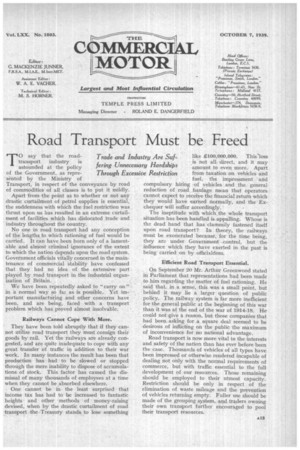Road Transport Must be Freed
Page 15

If you've noticed an error in this article please click here to report it so we can fix it.
TO say that the roadtransport industry is astounded at the policy of the Government, as represented by the Ministry of Transport, in respect of the conveyance by road of commodities of all classes is to put it mildly.
Apart from the point as to whether or not any drastic curtailment of petrol supplies is essential, the suddenness with which the fuel restriction was thrust upon us has resulted in an extreme curtailment of facilities which has dislocated trade and industry throughout the country.
No one in road transport had any conception of the lengths to which rationing of fuel would be carried. It can have been born only of a lamentable and almost criminal ignorance of the extent to which the nation depends upon the road system. Government officials vitally concerned in the maintenance of commercial stability have confessed that they had no idea of the extensive part played by road transport in the industrial organization of Britain.
We have been repeatedly asked to "carry on" in a normal way so far as is possible. Yet inF portant manufacturing and other concerns have been, and are being, faced with a transport problem which has proved almost insolvable.
Railways Cannot Cope With More.
They have been told abruptly that if they cannot utilize road transport they must consign their goods by rail. Yet the railways are already congested, and are quite inadequate to cope with any great transfer of traffic in addition to their war work. In many instances the result has been that production has had to be slowed or stopped through the mere inability to dispose of accumulafions of stock. This factor has caused the dismissal of many thousands of employees at a time when they cannot be absorbed elsewhere.
One cannot be in the least surprised that income tax has had to be increased to fantastic heights and other, methods of money-raising devised, when by the drastic curtailment of road transport the -Treasury stands to lose something Trade and Industry Are Suflike £100,000,000. Thieloss is not all direct, and it may is not all direct, and it may fering Unnecessary Hardships amount to even more. Apart Through Excessive Restriction from taxation on vehicles and fuel, the impressment and compulsory hiring of vehicles and the general reduction of road haulage mean that operators cannot expect to receive the financial return which they would have earned normally, and the Exchequer will suffer accordingly.
The ineptitude with which the whole transport situation has been handled is appalling. Whose is the dead hand that has clammily fastened itself upon road transport? In theory, the railways must be exonerated because, for the time being, they are under Government -control, but the influence which they have exerted in the past is being carried on by officialdom.
Efficient Road Transport Essential.
On September 20 Mr. Arthur Greenwood stated in Parliament that representations had been made to him regarding the matter of fuel rationing. He said that, in a sense, this was a small point, but behind it may lie a larger question of public policy. The railway system is far more inefficient for the general public at the beginning of this war than it was at the end of the war of 1914-18. He could not give a reason, but those companies that had been asking for a square deal seemed to be desirous of inflicting on the public the maximum of inconvenience for no national advantage. Road transport is now more vital to the interests and safety of the nation than has ever before been the case. Thousands of vehicles of all types have been impressed or otherwise rendered incapable of dealing not only with the normal requirements of commerce, but with traffic essential to the full development of our resources. Those remaining should be employed to their utmost capacity. Restriction should be only in respect of the elimination of waste mileage and the prevention of vehicles returning empty. Fuller use should be made of the grouping system, and traders owning their own transport further encouraged to pool their transport resources.




















































